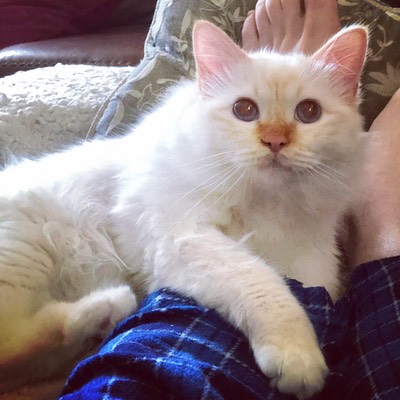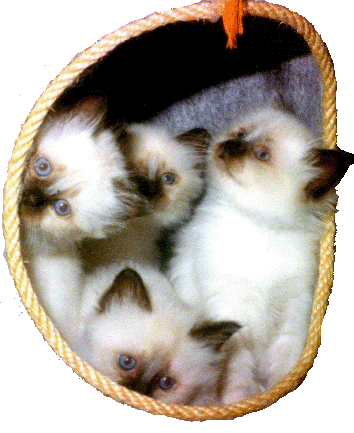What is the price of a pure breed Birman with a pedigree? Are these high prices justified?
My answer will give you an idea of how much a breeder is spending to keep up with the cost. Beside the investment for new acquisitions (it differs from one breed to another, from one country to another, a top show cat price can today goes up to 2,000$), other expenses are to be taken in consideration (+ transportation = $700). Price have been climbing a lot this past 5 years in Europe, Australia and New Zeeland (most expensive).
- This is not a very profitable business.
Unless you are breeding at a big scale (and do not know who is who among your kittens and how to keep your kittens clean), an amateur breeder does not really make any money on the kittens he/she sells (unless he/she is a vet). There are a lot of costs associated with breeding. Aside veterinarian bills: vaccinations, visits, health issues (they can get crazy if you have any disease to deal with and it spreads to all your cats), a breeder who goes to cat shows spends a lot of money there too (you have to pay to be in a show and the awards are not monetary, just ribbons and a reputation): entry fees (around $95 per cat at TICA, about $49 in CFA) + transportation + hotel + local restaurants. If you are trying to get titles for your cat, you can multiply that by twice a month, and then, at the end of the year you have spent several thousand dollars. Some breeders have to invest in buildings renovation for their cattery too, and it can be costly there too. Thus, kittens coming from parents with a title (Grand Champion, Supreme Grand Champion) will cost you more.
You are advise to take a Vet insurance when you get a kitten/cat as these expenses can be ridiculous in the USA (10 X more than in Europe. You are basically paying for the Vet pool and big house).
- Some breeders are cat merchants.
Now, I dare to say that, according to my observation for 24 years, there are two kinds of breeders: The cat merchants that see this as a business opportunity to make money; and the cat lovers who do it for the advancement of the breed and want to share their love of the breed with others (rare now). In the past 5 years, I have seen prices of Birmans double.
I recently went to a Birman breeder website who said she had a small cattery and I counted more than 14 cats. This is not a small cattery anymore!
- Importations
However, there are some new factors to take in consideration. One of the reasons for a higher price is that, in order to renew the pool, more and more breeders have to import cats from far away (Australia, Europe ...), and to pay between 1,500 to 2,000$ for a show cat (you have to pay in other currencies and the dollar has lost a lot of value). To add insult to injury, they also have to pay sometimes another close to 1,000$ for plane transportation (pet’s transports are a scam but unfortunately in many places now you are not authorized anymore to get a pet in cargo through a normal airline company without using expensive middle-pet cies services (they can go from $500 to $3,000! - I should write an article on this scam, one of these days, as I keep track of everything).
- Cat’s quality
The quality of a cat is determined by the cat’s standard published by cats’ associations (CFA, TICA, FiFe...). A good breeder will sell you a cat with the paperwork to obtain the pedigree from one of these recognized societies. The price of a cat is based on this standard. There are usually four cat quality degrees (some new breeders only have three qualities. Others sell all their cats as “show” quality. Pay attention! They lie. In the majority of the cases, you do not have all show cats in a litter). It s not becasue you have a Birman cat with nice symetrical gloves that you have a show cat! This is not enough contrary to what a lot of amateur breeders think.
The price of a kitten is determined by the quality of the kitten (not by the fact that you are going to put him/her in a show or not) according to CFA or TICA officials standard.
PET: a kitten/cat from pure breed Birman parents with a fundamental default according to the standard. By default we do not mean a behavioral or health default but a missing trait of the standard. For instance for a Birman, a default could be: asymmetrical gloves or a runner, no laces on the back paws, a white spot on the chin, no roman nose, a weak color, light blue eyes, dark spots on the robe, a knot in the tail, body too small, ... Prices differ from one state to another but, the price of these pet cats today begins around $1,400 (depends on the quality). These cats need to be neutered or spayed and cannot be use for reproduction because of their defaults. At that level, there are usually no difference in price between male or female. When you buy a cat you receive a contract and a cat association paperwork. This paper indicates the quality of the cat and, if it is a pet quality, you have no show or reproduction rights and you will never be able to obtain official papers for any kittens produced from these.
BREED: a kitten/cat from pure breed parents with a minor default according to the standard. May be the cat doesn’t have perfect symmetrical gloves but it has the rest. The cat would not win in a show but can be a good reproducer and produce kittens who might be of show quality. They usually sell around $1,500-$2,500. In the past, I remember that males were less expensive than female. Today, for whatever mysterious reason, it is the contrary, males can be more expensive than females. Go figure out why! I have heard everything in 24 years. It is completely arbitrary. You can sometimes buy one of these as at a pet price without reproduction rights and if you change your mind later pay an extra 500$ to get these rights. It depends of the breeder-buyer’s contract.
LOW SHOW QUALITY: a kitten/cat from pure breed Birman parents with show quality (meaning has all the element requested by the standard -no gloves missing for instance), who may become a champion (with no guaranties - it depends which cats are in competition) but may not be able to go farther up as he/she is not as spectacular as others. Price is above $1,800.
HIGH SHOW QUALITY: a kitten/cat from pure breed Birman parents with top show quality and exceptionally beautiful. She/he could become a Supreme Grand Champion. Price is around $1,500-2,600 (some go as high as $4,000 these days).
RETIRED QUEEN OR STUD: From time to time, some breeders are retiring their queens or studs. These are adult/top show cats and you can buy them for a lower price. To progress in their program, for a lack of room, breeders need to place their retired cats. There is also the case of a cat that do not behave well with others and needs to be the only cat in the house (a jealous cat for instance). This can be your chance to step in and to acquire a show adult at a lower price. The breeder can give you a lot of info on this cat as they know him/her well. They are usually sold neutered or with a neutering contract.
So! Where to buy? Here is my advice:
- Do not buy from a big cattery without having an in depth inspection.
- Be sure the kittens are well taking care of, socialized and clean. If there is a strong smell of cat urine when you visit the place, pass.
- If the price is excessive for the quality, do pass over. Do not get trapped in the cuteness of a kitten.
- If a kitten is sick, do not take him/her until he/she is declared healthy again, by a vet. (By healthy,we mean a main disease. Cats easily catch ticks and flies and benine things).
- If a kitten is shy, aggressive, do not come to you, is not playful, do not take him/her.
- Be sure you understand the contract correctly. The contract should give you some period of health warranties and what happens in case the kitten deceased ; is sold as a show quality and do nothing in shows ; is sold as a breeder and is infertile.
- The breeder should provide recognized Cat Club paperwork to obtain pedigree and official documents from them (you will have to pay a fee to these organizations to get them). The majority of the breeders will send you the kitten/cat's paper only after the cat has been neutered (if you have not bought a cat with reproductions rights).
- Try to get some references about a breeder (specifically about health issues).
- Do not buy in a pet store, but directly form a breeder. You want to know where the kitten is coming from (same issue happen in shelters where a lot of diseases are rampant).
- Have the cat tested by your vet for usual diseases when you get him/her in the next 24 hours you get him/her.
- If you do not have a good feeling with the breeder, pass!
- There is a Birman adult rescue center that is followed by Birman associations. You might have a chance there if you have a limited budget.


